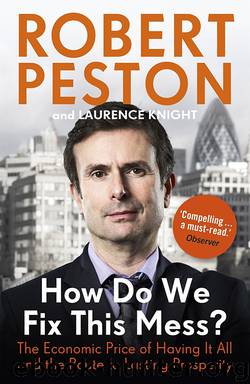How Do We Fix This Mess by Robert Peston

Author:Robert Peston [Peston, Robert]
Language: eng
Format: epub
Publisher: Hodder & Stoughton
Published: 2012-09-26T23:00:00+00:00
The first important phase in this union of France and Germany was the creation in 1951 of the European Coal and Steel Community. It was a practical and symbolic industrial agreement, establishing joint political control of the basic industries viewed at the time as of greatest economic importance. The logic behind the ECSC was the same as has propelled the European project ever since – including the creation of the euro. France and Germany, and any other country that cared to be involved, would begin to interlock their economies. The ensuing mutual dependence would ward off the kind of conflict that could escalate into war. Then in 1957 came the Treaty of Rome, establishing what at the time was called the European Economic Community. Signed by Germany, France, Italy, Belgium, Luxembourg and the Netherlands, its aim was to reinforce peace and prosperity by ‘strengthening the unity’ of economies.
With a single European economy as the destination, from the start it was logical to merge the currencies of Europe to create a single currency. Plans for monetary union were first drawn up at the end of the 1960s, when the Prime Minister of Luxembourg, Pierre Werner, was commissioned by European governments to write a proposal for how the six members of the EEC could combine their currencies. In 1970, Mr Werner presented his plan for how a single currency could be launched ten years later. At the time, Mr Werner said he and his fellow European government heads had ‘reaffirmed the irreversibility of a process that would lead to economic and monetary union’. But although he was right about the direction of travel, the deadline was too soon.
In the 1960s, the world’s financial markets worked very differently from today. Currencies did not rise or fall at the whim of speculators in London and New York. Instead, governments fixed the exchange rates of their currencies relative to the US dollar, which in turn was tied to the price of gold. This was known as the Bretton Woods system, named after the 1944 conference at a New Hampshire ski resort where US and European leaders laid the foundations of the postwar world economic system. Bretton Woods provided a degree of financial stability for the reconstruction of Europe’s economies, so devastated by the War. But by the late 1960s, the system was creaking. Some countries – notably the UK and France – found themselves unable to compete in international trade. Wage rises demanded by trade unions meant their exports were uncompetitive. They found themselves importing more and more cheap foreign goods, especially from resurgent Germany and Japan, and having to borrow from the rest of the world to pay for them. The borrowing was unsustainable. The UK was the first to crack. In 1967 the government was forced to devalue sterling – prompting the British Prime Minister Harold Wilson to utter the immortal solecism that he had not ‘devalued the pound in your pocket’. Then France followed with a devaluation of the franc in 1969. France’s devaluation was not a happy experience.
Download
This site does not store any files on its server. We only index and link to content provided by other sites. Please contact the content providers to delete copyright contents if any and email us, we'll remove relevant links or contents immediately.
International Integration of the Brazilian Economy by Elias C. Grivoyannis(111057)
The Radium Girls by Kate Moore(12026)
Turbulence by E. J. Noyes(8047)
Nudge - Improving Decisions about Health, Wealth, and Happiness by Thaler Sunstein(7706)
The Black Swan by Nassim Nicholas Taleb(7128)
Rich Dad Poor Dad by Robert T. Kiyosaki(6631)
Pioneering Portfolio Management by David F. Swensen(6300)
Man-made Catastrophes and Risk Information Concealment by Dmitry Chernov & Didier Sornette(6019)
Zero to One by Peter Thiel(5798)
Secrecy World by Jake Bernstein(4751)
Millionaire: The Philanderer, Gambler, and Duelist Who Invented Modern Finance by Janet Gleeson(4478)
The Age of Surveillance Capitalism by Shoshana Zuboff(4291)
Skin in the Game by Nassim Nicholas Taleb(4248)
The Money Culture by Michael Lewis(4205)
Bullshit Jobs by David Graeber(4190)
Skin in the Game: Hidden Asymmetries in Daily Life by Nassim Nicholas Taleb(4004)
The Dhandho Investor by Mohnish Pabrai(3764)
The Wisdom of Finance by Mihir Desai(3746)
Blockchain Basics by Daniel Drescher(3580)
